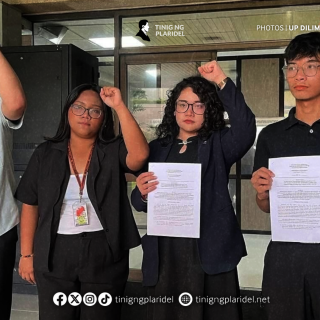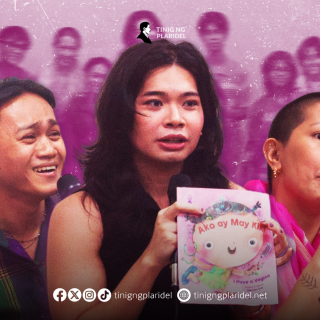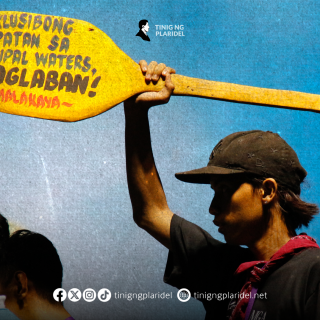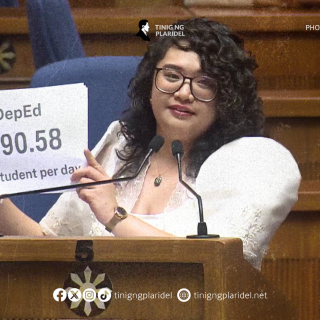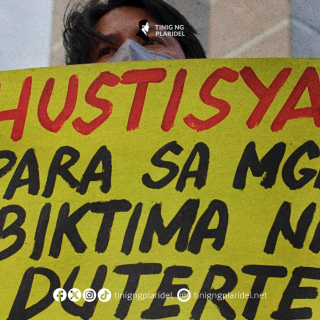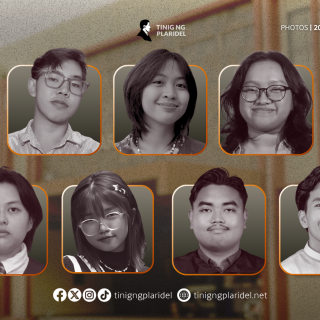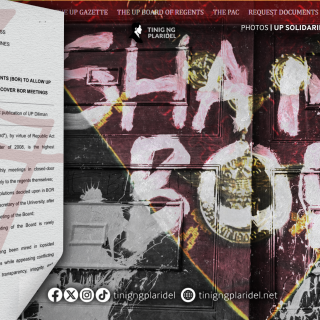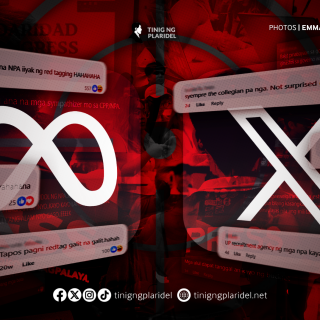Article by J.M.
First-year architecture student Ardeen Ramos spends around two to three hours scrolling through the short-form video platform TikTok in his free time.
On his For You page, TikTok’s home screen featuring curated clips based on users’ interactions, was an audio recording of late dictator Ferdinand Marcos Sr. claiming he “never stole anything from the Filipino people.”
The recording was played with a slideshow of infrastructure projects built under his administration.
“Nagtaka ako na baka mali pala yung pagkakaalam ko, kung may mali ba sa alam ko sa mga Marcos kasi matagal na ako [huling] nag-aral ng Philippine history,” Ardeen said.
Contrary to the video’s claims, two court cases show that Marcos Sr. and his wife Imelda have acquired ill-gotten wealth.
One of the cases was filed before the Supreme Court and assets amounting to over $658 million were forfeited in favor of the Philippine government.
However, these truths remain untaught in the classroom, with the exclusion of Philippine History classes in the secondary education curriculum.
Before college, Ardeen last took Philippine History classes in sixth grade. When he entered high school in 2014, Philippine History was no longer taught as an Araling Panlipunan subject.
This was part of the Department of Education’s (DepEd) basic education curriculum revisions, following the implementation of the K-12 program in 2012.
What happened to Philippine History education
In a 2014 directive, DepEd replaced Philippine History with Asian Studies as the Araling Panlipunan subject for Grade 7 students.
“Nakakalungkot kasi ‘yung mostly na gumagawa [ng misleading videos sa TikTok] ay mga kapwa ko kabataan. At saan nga ba tayo nagkulang? Siyempre sa education, kasi tinanggal ‘yung Philippine History [na subject],” Ardeen explained.
History educators, experts and advocates have since protested this decision and reinforced the call to reinstate Philippine History as an independent subject in the secondary level now that another Marcos serves as the country’s president.
Araling Panlipunan teacher Jamaico Ignacio believes it would be better to extract deeper learning of Philippine History in high school given how learners are still young when they first have history classes at the elementary level.
“For example, ‘yung gravity ng issues related to comfort women, that’s a very heavy issue na kailangan ma-internalize and based on my experience, hindi pa ‘yon masyadong naga-grasp ng grade school students. Kung kailan umuusbong ‘yung adolescence age, doon nila mas nai-internalize ‘yon,” he added.
Ignacio is the president of the High School Philippine History Movement, a non-government organization calling to institutionalize Philippine history subjects in both junior and senior high school curricula.
Joey Dela Cruz, a former history teacher at Xavier School, pointed out how gaps in the students’ acquired knowledge continue to grow due to the removal of foundational history courses.
He views such foundational courses as “building blocks” for other Araling Panlipunan subjects, such as Contemporary Issues in the Grade 10 curriculum.
“Wala kang babalik-tanawan para maintindihan mo ang mga kontemporaryong isyu sa bansa,” Dela Cruz said.
However, DepEd maintained that Philippine History is already “integrated” across other core social studies subjects taught in Grades 7 to 12, including Asian Studies, World History and Contemporary Issues among others.
But looking back on his high school years, Ardeen explained how this integration fell short in instilling the essence of history in students.
“If naging successful ‘yung integration na ginawa nila, dapat mayroong na-reretain sa students na knowledge about Philippine History pero sa nakikita natin ngayon at sa na-experience ko, halos wala talaga,” he said.
Ardeen also mentioned how there is not enough historical information available to “process and absorb” now that Philippine history is simply “integrated” into other subjects.
To make up for his knowledge deficit, he resorted to YouTube videos and other online resources to learn.
Shortly before taking office, Vice President and Education Secretary Sara Duterte already expressed her plans to comprehensively review the K-12 program.
However, Duterte’s camp earlier dismissed calls from ACT Teachers Party-list Representative France Castro to fight historical distortion by restoring Philippine History as an independent subject in high school, calling it “premature and misleading.”
Castro urged Duterte not to use the education system “as a tool for further revision of our history” and to ensure that the curriculum will not “aid historical revisionism and denialism for the sins against the Filipino people.”
“The next DepEd chief should be able to discern the importance of the subjects, as according to her, this would play a major role in the downfall of the quality of education,” Castro’s statement read.
‘An intergenerational problem’
Mark Madrona, a history lecturer at the University of the Philippines Diliman, said there has been a “long-term project” of degrading History and Social Studies even before K to 12.
“It’s an intergenerational problem. Dati pa lang, problematic na ‘yung pagtuturo ng Philippine History, ” Madrona said.
Dela Cruz also added that “a deliberate move to remove history from the equation” is in the works to better fit global and economic demands.
“Habang pumapasok tayo sa globalisasyon, ‘yung trends na kaakibat nito ang sinusunod sa pagbabago ng edukasyon. Kaya nga tayo may K to 12, hindi ba?” Dela Cruz said.
The law behind the K-12 program, the Enhanced Basic Education Act of 2013, states that among its goals was to create “quality education that is globally competitive” and prepare students for an “increasingly globalized environment.”
“This is how society, and even curricularists, put no importance and significance for Philippine History and Social Studies at dahil dito kaya nagkakaroon ng years-long historical knowledge gap sa mga estudyante,” said Madrona.
Making history ‘more digestible’
Without a dedicated subject for Philippine history, Madrona said many students have resorted to alternative sources for historical information such as TikTok, Youtube and Facebook to fill the information gap.
The Philippine Statistics Authority reported in 2019 that 92.9 percent of Filipino students aged 10 to 30 surfed the internet for social media.
In addition, TikTok recorded a total of 35.96 million Filipino users aged 18 and above earlier in 2022.
However, a recent study made by US-based misinformation tracker NewsGuard showed that 105 out of 540 search results generated on TikTok contained false or misleading information.
As a result, Madrona believes formal institutions must explore contemporary ways of teaching Philippine history.
“Unless History experts are also able to go with the flow and adapt as to how the current and future generations consume information, wala ring mangyayari,” Madrona said.
For Ignacio, Philippine history should be made more digestible to students to combat historical distortion.
“Dapat lumakas din ‘yung public history, ‘yung pag-disseminate ng historical knowledge sa publiko kasi kung matetengga lang ‘to sa archives, sa mga library, masasayang din,” he explained.
Among Ignacio’s suggestions was to further engage with the public through mass media, similar to what historians Xiao Chua, Ambeth Ocampo and history enthusiast Mona Magno-Veluz or “Mighty Magulang” are doing today.
Ardeen believes that educators should utilize more interactive learning approaches to make Philippine history more appealing and comprehensible for students like him.
“Gamitin natin ‘yung technological advancements na mayroon tayo ngayon sa tamang paraan. Kung ano ‘yung mas appropriate na teaching style, ayon ang gamitin. Gamitan mo siya ng pictures, videos, or anything visual kasi mas naa-appreciate namin ‘yon,” he explained.
Ultimately, Ardeen called for education leaders to heed the protest of students, teachers and history advocates to reinstate Philippine history in the high school curriculum as he believes that historical knowledge played a major role in the outcome of this year’s national elections.
“Kung alam mo ang history, alam mo kung sino ang iboboto at kung sino ang hindi dapat [iboto]. Noong election, maraming TikTok [content] creators ang gumamit ng topic na ito [history] para maging vocal sa kanilang pinaniniwalaan. Kung kaya’t marami rin ang naimpluwensyahan ng mga gawa nila,” he narrated.
With TikTok’s rising popularity alongside other online media platforms, Ardeen is just one of the many students who fall victim to historical distortion and disinformation.
Educators like Ignacio, Dela Cruz and Madrona believe that unless government officials and education leaders address the ongoing issues in history education, the nation’s history will only remain a subject of disinformation, allowing it to be reversed and forgotten.


